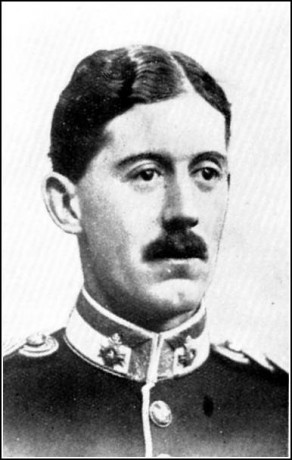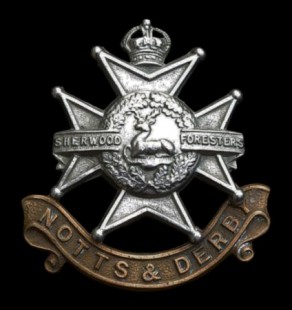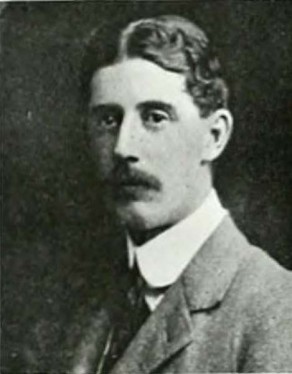26 March 1915
THE LATE CAPT. STACKHOUSE, OF SETTLE
Last week the sad news was received at Settle that Captain W.T. Stackhouse, of the Sherwood Foresters, had been killed in action on the 12th inst., near Neuve Chapelle. Captain Stackhouse was the elder son of the late Major Stackhouse, of Ingfield Hall, Settle, and Mrs. Stackhouse of Casterton Grange, Kirkby Lonsdale. He was born in 1883 and educated at Harrow and Sandhurst, whence he gained a commission in the 4th Lancashire Fusiliers. When the latter regiment was disbanded in 1906 he was offered a lieutenancy in the 2nd Sherwood Foresters (Notts. and Derby). He received his captaincy in 1913. Before going to the Front in October 1914 he was adjutant to the 10th Battalion. He was an officer whose cheery and kindly nature made him extremely popular with the men who served under him. He was a keen sportsman; polo, shooting and motoring being amongst his favourite pursuits. His younger brother, Lieut. J. Stackhouse, was also in the Sherwood Foresters and sailed last week to join Captain Stackhouse in active military duty at the Front, the time of his departure being earlier than the arrival of the news of Captain Stackhouse’s death. The deceased officer married in 1912 Theodora Charlotte, second daughter of Mr. and Mrs. Norrington of Abbotsfield, Plymouth. He was the owner of considerable estate in Settle and immediate neighbourhood, and his death plunges one of the oldest families in the district into mourning.
24 December 1915
CRAVEN’S ROLL OF HONOUR – SETTLE
Capt. W.T. Stackhouse, Sherwood Foresters, killed in action in March. Elder son of the late Major Stackhouse, Ingfield Hall, Settle.
04 January 1918
SETTLE’S FALLEN HEROES
Memorial Service at the Parish Church
A memorial service for the Settle soldiers who have fallen in the war was held at the Parish Church last Sunday afternoon. There was a large congregation, and the service was conducted by Rev. W. E. Linney (vicar). The hymns ‘God of the living in Whose eyes,’ ‘Jesus lives,’ ‘On the resurrection morn,’ and ‘ O God our help in aged past’ were sung, and the ‘Last Post’ was sounded at the close of the service by two of the local Cadets. The organist (Mr. F. Lord) also played appropriate music as the congregation assembled and left the church.
The Vicar, in the course of his sermon, said they were met to remember the Settle soldiers, men, and boys – some indeed little more than boys – who had laid down their lives for the country at the war, whether during the year which was just drawing to a close or in the earlier stages of the conflict. When he asked them to remember those heroes that day, he knew that he was asking them to do what they were always doing. They were their own dear ones united to many of them by ties of blood – husbands, fathers, brothers, sons, as well as friends. How could they forget them? Were they not reminded of them day by day by the gaps in their home circles, which could never again be filled by them? They all desired in their hearts that God would bless and keep them, and give them peace. and happiness. The Vicar then read the following list of the Settle men who had laid down their lives:– John Edward Bell, Geo. S. Belles, Fredk. Baldwin, John Barrett, Robert Bateson, William Bradley, Frank Bulcock, George R. Bullock, Herbert Clark, John Cokell, Edward Ellershaw, Jas. Ewart, Wm. Ewart, Fredk. Frost, Harold Goss, Alfred Gower, Joseph Lord, John Morphet, John Packard, Chas. Peachey, Thomas Howarth Preston, Albert Ralph, Thos. Stackhouse, George Edward Turner, Derwent Turnbull, Wm. Troughton, Harry Walton, John Edward Wilson, Ernest Wooff, and Robert Wooff. Proceeding, the Vicar said they had a responsibility with regard to those men. They owed them a debt, and he trusted and believed that they were wishful to do all that they could to repay it. “ Our lives are being saved by their death. If we have any future before us on the earth it is because they gave up their futures to secure it. Their right to survive was as good as our own. Many of them would have been of far more use in the world than we can hope to be. The future stands to be only poorer for our surviving in their stead. We are debtors to them for all they have given us. To the future think of all it has lost in them.” How were they going to pay the debt, and in paying it to honour their heroic dead? Surely there could be but one answer – to live to give effect to their ideals. When they were asked what those ideals were, they might be well put in the words of Bishop Walshaw How’s hymn written for the diamond jubilee of Queen Victoria, “To make the world a better world for man’s brief earthly dwelling.” If Prussian militarism should gain the ascendancy the world would be scarcely a fit place to live in. What they wanted was the triumph of right and liberty. That was the task they had begun, and many of them, fired by the enthusiasm of a noble cause, literally went singing to their death. The old life which had no loftier aim than a high standard of material comfort had been felt to be unsatisfactory. To ardent youth the higher spirit of self-sacrifice, which was the spirit of Christ, beckoned onward with irresistible attractiveness, and they followed the gleam. They had yet to complete the great task to which they dedicated themselves. That was the way they could honour the memory of their fallen heroes, and with confidence that they had not died in vain.
A collection taken on behalf of the Red Cross Society realised £5 15s.










No comments yet.